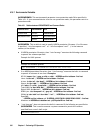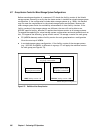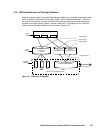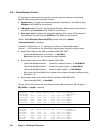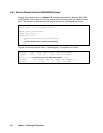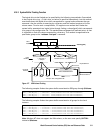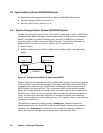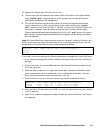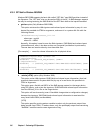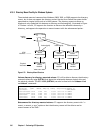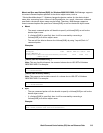
312 Chapter 4 Performing CCI Operations
1.
Offline backup used ‘raidscan-find sync’ for Windows NT file system:
‘raidscan-find sync’ flushes the system buffer through finding a logical drive which
corresponds to a group of the configuration file, so that the user will be able to use
without using -x mount and -x umount command. The following is an example for group
ORB.
P-VOL Side S-VOL Side
Close all logical drives on the P-VOL by APP.
Flush the system buffer for P-VOL using
“raidscan -pi $LETALL -find sync -g ORB”.
Split the paired volume using “pairsplit -g ORB”
with r/w mode.
Open all logical drives on the P-VOL by APP.
Resynchronize the paired volume using
“pairresync -g ORB”.
Back up the SVOL data.
Flush the system buffer for SVOL updates using
“raidscan -pi $LETALL -find sync -g ORB” when the backup
is finished.
2. Offline backup used ‘raidscan-find sync’ for Windows 2008/2003/2000 file system:
‘raidscan-find sync’ flushes the system buffer associated to a logical drive through
finding a Volume{guid} which corresponds to a group of the configuration file so that the
user will be able to use without using -x mount and -x umount commands. The following
is an example for group ORB.
P-VOL Side S-VOL Side
Close all logical drives on the P-VOL by APP.
Flush the system buffer for P-VOL using
“raidscan -pi $Volume -find sync -g ORB”.
Split the paired volume using “pairsplit -g ORB”
with r/w mode.
Open all logical drives on the P-VOL by APP.
Resynchronize the paired volume using
“pairresync -g ORB”.
Flush the system buffer for NEW S-VOL data using
“raidscan -pi $Volume -find sync -g ORB”.
Back up the SVOL data.
Flush the system buffer for SVOL updates using
“raidscan -pi $Volume -find sync -g ORB” when the backup
is finished.
3. Online backup used ‘raidscan-find sync’ for Windows NT file system:
‘raidscan-find sync’ flushes the system buffer through finding a logical drive which
corresponds to a group of the configuration file, so that the user will be able to use
without using -x mount and -x umount commands. The following is an example for
group ORB.
P-VOL Side S-VOL Side
Freeze DB on opening PVOL by APP.
Flush the system buffer for PVOL using the
“raidscan -pi $LETALL -find sync -g ORB”.
Splits the paired volume using
“pairsplit -g ORB” with r/w mode.
Unfreeze DB on opening PVOL by APP.
Resynchronize the paired volume using
“ pairresync -g ORB”.
Back up the SVOL data.
Flush the system buffer for SVOL updates using
“raidscan -pi $LETALL -find sync -g ORB”
when the backup is finished.



